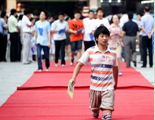网址:http://m.1010jiajiao.com/timu3_id_2442872[举报]
People enjoy taking trips. But what are the reasons they leave home? One reason is for education. People travel because they want to learn more about other people and other places. They are curious about other cultures. When people are tourists, they get a quick look at different ways of living. Even a short look at another kind of lifestyle is an important lesson. On a trip, a person can learn directly by visiting museums and historic spots. What does a tourist learn who sees the art museums, visits the historical palaces and other scenic spots in Paris and shops along the River Seine? He gets a vivid picture, a real life of one of the French people. He learns about their attitudes(态度), how they feel about business, beauty and history.
What about the tourist who goes to Hong Kong? Does he get the same information that he could get from a book? He might read that Hong Kong is crowded, that there is less than 200 square meters of space for each person. But seeing and feeling the lack of space will impress him much more. He might read that there are nearly 200 vehicles for every kilometer of roadway. But the sight of so many vehicles parked along the roadside would be a much more vivid lesson. The tourist to Hong Kong will never forget the contrasts(对比,对照): the straight vertical lines of tall modern buildings and the moving lines of boats that people live in.
【小题1】Why do people leave home to travel according to the passage?
| A.For education. |
| B.For adventure. |
| C.To enjoy themselves. |
| D.To look for a different lifestyle. |
| A.It has a large population. |
| B.It has many tall buildings. |
| C.There are 200 vehicles for every kilometer of roadway. |
| D.There are many museums and palaces. |
| A.It has many big and beautiful parks. |
| B.It is very crowded. |
| C.It has many historical spots. |
| D.It is an important industrial center. |
| A.It makes our life more interesting. |
| B.It enables us to get first-hand knowledge. |
| C.It helps develop our personalities. |
| D.It brings about changes in our lifestyle. |

Li Wei's College Dream
Li Wei, a 22-year-old
 young man is named "Strong Brother" by netizens (网友). He walked on his
young man is named "Strong Brother" by netizens (网友). He walked on hisknees all the way to the 2011 national college entrance examination (高考) room. He was born in a poor
family in Shanxi province. But unluckily, a traffic accident took away his legs when he was only 3 years
old. His life has changed since then. Without feet, he had to spend most of his time practicing walking
on his hands and knees. Everybody who sees Li Wei for the first time is surprised to see that he can
easily play tennis or climb up stairs without feet. Some people even think he still has feet, but has short
legs.
With hard work, Li Wei finished all his school study. In 2011, he became a college student in
Chongqing Normal University. Now he has been enjoying his college life. And he received a new
pair of artificial legs (假肢) from China Disabled Person's Federation(残联).
He likes the popular song which says"I know my future is not a dream, I will live happily for every
minute of my life. My future is not a dream. My heart moves with the hope…
 at is the name that netizens give to Li Wei?
at is the name that netizens give to Li Wei?_______________________________________________
2. How old was Li Wei when the traffic accident took away his legs?
_______________________________________________
3. Can he walk or play sports without feet?
_______________________________________________
4. When did he become a college student in Chongqing Normal University?
_______________________________________________
5. What do you think of Li Wei from his story?
_______________________________________________
What about the tourist who goes to Hong Kong? Does he get the same information that he could get from a book? He might read that Hong Kong is crowded, that there is less than 200 square meters of space for each person. But seeing and feeling the lack of space will impress him much more. He might read that there are nearly 200 vehicles for every kilometer of roadway. But the sight of so many vehicles parked along the roadside would be a much more vivid lesson. The tourist to Hong Kong will never forget the contrasts(对比,对照): the straight vertical lines of tall modern buildings and the moving lines of boats that people live in.
小题1:Why do people leave home to travel according to the passage?
| A.For education. | B.For adventure. |
| C.To enjoy themselves. | D.To look for a different lifestyle. |
| A.It has a large population. |
| B.It has many tall buildings. |
| C.There are 200 vehicles for every kilometer of roadway. |
| D.There are many museums and palaces. |
| A.It has many big and beautiful parks. |
| B.It is very crowded. |
| C.It has many historical spots. |
| D.It is an important industrial center. |
| A.It makes our life more interesting. |
| B.It enables us to get first-hand knowledge. |
| C.It helps develop our personalities. |
| D.It brings about changes in our lifestyle. |
B. There is a fish.
C. There are some cakes.
D. There is some meat.
B. A cat
C. A dog
D. A bird
B. either
C. neither
D. also
B. No, he doesn't.
C. Yes, he doesn't.
D. No, he does.
B. The folder catches one of his paws.
C. The cat catches the rat.
D. The rat catches the cat.